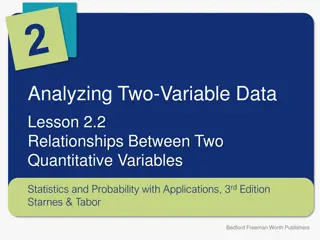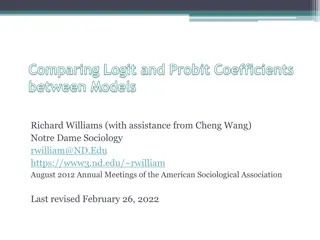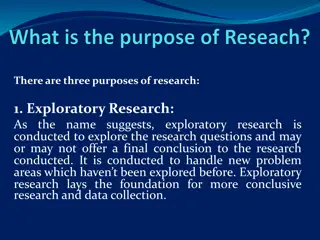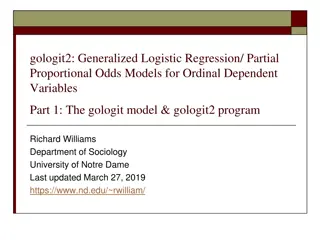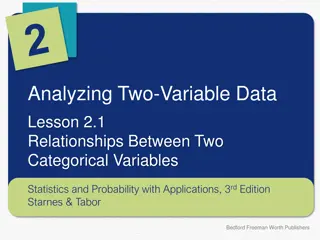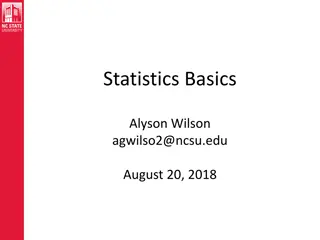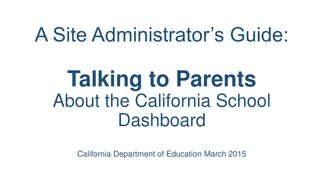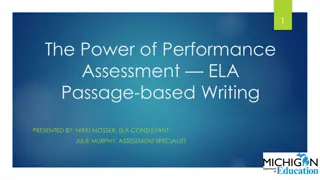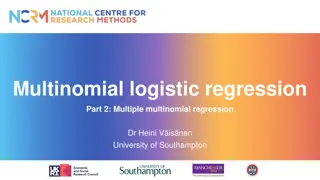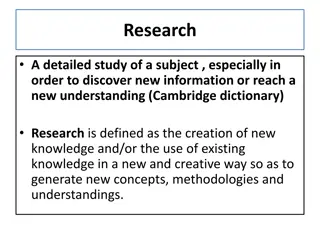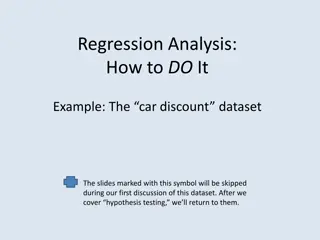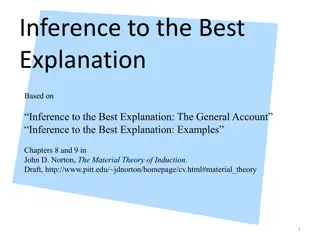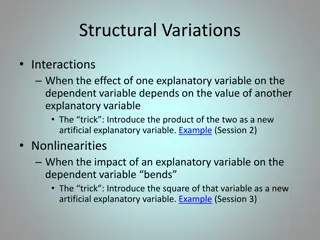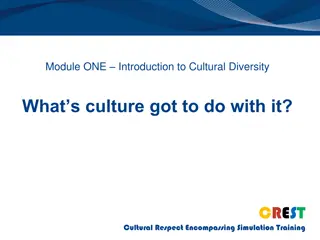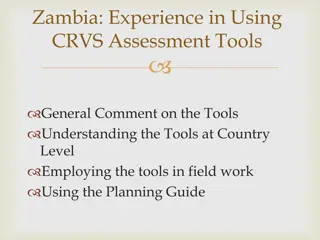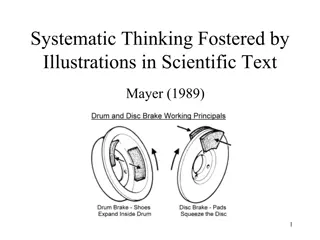Interpretation
Interpretation in research methodology involves drawing inferences from collected data, establishing continuity in research, and developing explanatory concepts for future studies. It helps researchers understand abstract principles, make predictions, and maintain research continuity. Interpretation
4 views • 5 slides
Analyzing Two-Variable Data in Statistics and Probability
This content delves into analyzing relationships between two quantitative variables in statistics and probability, focusing on distinguishing between explanatory and response variables, creating scatterplots, and interpreting the strength and form of relationships displayed. It emphasizes the import
0 views • 14 slides
Comparing Logit and Probit Coefficients between Models
Richard Williams, with assistance from Cheng Wang, discusses the comparison of logit and probit coefficients in regression models. The essence of estimating models with continuous independent variables is explored, emphasizing the impact of adding explanatory variables on explained and residual vari
1 views • 43 slides
Understanding Chronology in the Victorian Curriculum History
Chronology is essential in historical reasoning, providing structure for organizing historical thought. The Victorian Curriculum History emphasizes the sequencing of events to analyze causality, continuity, and change, enabling students to develop explanatory narratives about the past.
1 views • 35 slides
Understanding Explanatory Cross-Sectional Designs in Research
Explore the world of cross-sectional designs in research, focusing on the explanatory type that delves into relationships among variables within populations. Learn about the distinctive features, types of designs, and research objectives associated with this methodology.
3 views • 23 slides
Year 5 English Home Learning Week: 18.5.20
Beginning with setting descriptions, Year 5 English Home Learning for the week of 18.5.20 mirrors Math live lessons online. Each session includes quizzes, explanatory videos, activities, and post-lesson quizzes to gauge comprehension. Students are encouraged to share their final setting descriptions
1 views • 13 slides
Exploring Empiricism: Francis Bacon and Classical Perspectives
Empiricism, as championed by Francis Bacon, emphasizes the role of sensory experience in forming ideas over innate notions. It asserts that the human mind is like a tabula rasa, developing solely through observation and experimentation. Various forms of empiricism, such as explanatory and genetic em
0 views • 9 slides
Regulation of Built Environment Professions: Explained
This explanatory note, written by Adv. Pieter Fourie, delves into the purpose and background of the regulation of built environment professions. It provides insights into the relevant legal and regulatory aspects shaping this area, offering valuable information and perspectives. Scheduled for public
1 views • 8 slides
Understand the Three Purposes of Research
Explore the realms of exploratory, descriptive, and explanatory research. Discover how each type serves unique objectives in the research process, from uncovering new problem areas to validating findings. Learn about the structured and unstructured approaches used in different research methodologies
1 views • 11 slides
Overview of gologit2: Generalized Logistic Regression Models for Ordinal Dependent Variables
gologit2 is an advanced program for estimating generalized logistic regression models, including proportional odds, generalized ordered logit, and partial proportional odds models. It offers features beyond traditional ologit, allowing for less restrictive and more parsimonious modeling of ordinal d
0 views • 27 slides
Understanding Theories and Concepts in Research
The content delves into the fundamental concepts of theories and variables in research. It discusses the nature of theories, including descriptive, explanatory, and predictive theories. Additionally, it examines the role of concepts in providing identity and meaning to objects and phenomena. Through
2 views • 55 slides
Analyzing Relationships Between Categorical Variables in Statistics
Explore relationships between two categorical variables in statistics, distinguishing between explanatory and response variables. Learn to create segmented bar charts and identify associations. Understand the importance of identifying explanatory variables in analyzing data relationships. Improve yo
0 views • 15 slides
Understanding Basic Concepts in Statistics
This content covers fundamental concepts in statistics such as populations, samples, models, and probability distributions. It explains the differences between populations and samples, the importance of models in describing populations, and discusses various distributions like the normal and Poisson
0 views • 42 slides
Mastering Explanatory Writing: Unlocking the Power of Courage and Heroism
Dive into a comprehensive writing workshop focused on developing courage and heroism in your explanatory essays. Explore essential learning goals, understand key aspects of the rubric for high scores, and master the elements of purpose, focus, evidence, elaboration, and conventions to elevate your w
0 views • 20 slides
A Guide to Talking with Parents About the California School Dashboard
This guide is designed for site administrators to effectively communicate information to parents regarding the California School Dashboard. It covers an overview of the dashboard, details on measures, school performance data, and available parent resources. The deck provides customization tips to ta
0 views • 19 slides
The Power of Performance Assessment in ELA Writing
Explore the significance of Passage-based Writing in ELA assessments, covering informative, explanatory, and narrative writing across grades. Understand the scoring process, exemplars, and how to create prompts aligned with writing standards. Gain insights into Claim 2 of M-STEP and the 4-point scor
0 views • 35 slides
Comprehensive Guide to Multiple Multinomial Logistic Regression with Dr. Heini V.
Learn about multinomial logistic regression models with multiple explanatory variables, including model selection, likelihood ratio tests, and Wald tests. Explore an example on the association between economic activity, gender, age, and marital status. Understand the distribution of variables like e
0 views • 17 slides
Understanding Kinetic and Potential Energy: A Visual Exploration
Delve into the concepts of kinetic and potential energy through engaging visuals and explanatory content. Learn about the factors affecting kinetic energy, compare energy levels between objects in motion, explore the calculation of kinetic energy, and discover the storage and examples of potential e
0 views • 15 slides
English Language Arts Week at a Glance: November 11-15, 2019 with Fran Boseman
Standards covered during English Language Arts Week include citing textual evidence, determining central ideas, analyzing text structure, understanding author's point of view, and writing informative/explanatory texts. Instructional activities involve daily vocabulary warm-up, reading selections fro
0 views • 4 slides
Understanding Witness Statements: Rules and Best Practices
Witness statements play a crucial role in legal proceedings, and it's essential to grasp the rules governing human memory, the scope of witness evidence, and the content required in such statements. Human memory is dynamic and susceptible to influences, emphasizing the need for accurate and reliable
0 views • 20 slides
Understanding the Purpose of Research: Exploratory, Descriptive, and Explanatory Studies
Research is a systematic inquiry process that involves data collection, critical information documentation, analysis, and interpretation. It serves three main purposes: exploratory research to explore questions, descriptive research to expand knowledge on current issues, and explanatory research to
0 views • 14 slides
Enhancing Writing Skills through Iowa Core ELA Standards
Explore the session goals, learning targets, professional considerations, and literacy standards aimed at improving writing skills based on the Iowa Core ELA Standards. Discover the importance of argumentation writing, incorporating standards effectively, and fostering creativity through informative
0 views • 68 slides
Understanding Car Purchase Discounts Through Regression Analysis
A new-car dealership owner conducted a study on 100 purchasers of mid-size cars to analyze the relationship between customer characteristics (age, annual income, sex) and negotiated discounts. The dataset includes information on purchaser demographics and the discount received. By examining the univ
0 views • 41 slides
Inference to the Best Explanation - Examples in Scientific Theories
The concept of Inference to the Best Explanation (IBE) emphasizes the importance of theories or hypotheses that not only predict evidence but also provide the best explanation for it. Illustrated through examples from Darwin's theory of natural selection and Einstein's General Theory of Relativity r
0 views • 23 slides
Advanced Techniques in Regression Analysis
Explore various advanced techniques in regression analysis, including structural variations, interactions, and nonlinearities. Learn how to handle situations where the effect of one explanatory variable depends on another, or when the relationship between variables bends non-linearly. Discover trick
0 views • 5 slides
Exploring Christian Beliefs: The Power of Metanarrative and Historical Evidence
Delve into the intuitive and explanatory power of the Christian metanarrative, which upholds morality, meaning, dignity, free will, and love. Discover the historical evidence for the resurrection, emphasizing the distinct Christian notion and the significance of witnesses. Additionally, ponder the c
0 views • 5 slides
Understanding Cultural Diversity in Healthcare Training
Delve into the significance of culture in healthcare, exploring its impact on health beliefs and communication. Discover the importance of cultural sensitivity and the complexities of negotiating between different health beliefs in diverse populations. Gain insights into the influence of cultural as
0 views • 26 slides
Evolution of Physics Goals in the Late 19th Century
Physicists in the late 19th century shifted towards modesty regarding the aims of physics, moving away from ontology and truth claims. The ideal of reduction to matter and motion was criticized, and determinism was seen as a regulative principle rather than a proven feature. The concept of descripti
0 views • 35 slides
Zambia's Experience with CRVS Assessment Tools and Planning Guide
Zambia's experience in using CRVS assessment tools highlighted both positives and areas for improvement. The tools were found to be comprehensive but sometimes too detailed, with repetitive questions needing alignment. Understanding the tools at the country level involved meetings and trainings, whi
0 views • 7 slides
Simulation-Based Tests for Comparing Multiple Means
Simulation-based tests provide a method for comparing multiple means by assuming no association between explanatory and response variables. Null distributions are created by shuffling data and calculating differences in means. The observed differences in sample means are then compared to the null di
0 views • 45 slides
Effects of Illustrations on Systematic Thinking in Expository Text Understanding
Understanding how illustrations impact the development of mental models when processing expository text is explored in Mayer's study. The experiment with novice college students shows that text paired with illustrations promotes better recall and transfer of explanatory information compared to text
0 views • 15 slides
Understanding Tabulation in Statistical Analysis
Tabulation is a crucial aspect of statistical analysis, involving the logical arrangement of quantitative data in columns and rows with explanatory details. It serves various objectives such as simplifying complex data, economizing space, facilitating comparison and analysis, saving time, depicting
0 views • 12 slides

